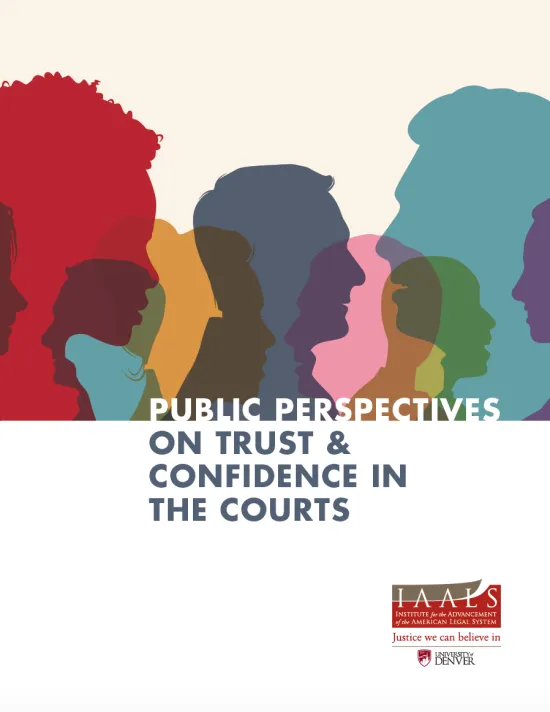Public Trust and Confidence

The courts in the United States exist to uphold the rule of law. But they do not operate in a vacuum, separate from the people they serve. To operate effectively, courts rely on the trust and confidence of the public—and we know the public’s trust in the system is too low. Surveys and public polls largely tell the same story: many people perceive racial and gender bias and socioeconomic bias within the system, and many also have concerns over the role of politics in judicial decision making. IAALS’ Public Trust and Confidence project dived deeper into the issue, working closely with key partners and stakeholders, including—most importantly—members of the public themselves.
Objectives
- Conduct exploratory research to facilitate a deeper understanding of how the public views the justice system and what drives public perceptions and attitudes.
- Identify opportunities for additional research and advocacy that can help legal system stakeholders re-earn the trust and confidence of the public.
- Curate outside perspectives from legal system experts to explore unique facets of the issue of public trust and confidence in the system.
- Inform IAALS' other user-focused research and projects.
The Public Research Study
The centerpiece of IAALS’ work in this critical area is our qualitative research study. Researchers have frequently studied the issue of public trust and confidence in the courts, including a large body of survey and public polling data. While this research provides useful insights into how members of the public view the courts and American legal system, polls are limited in terms of depth of information they can provide. A qualitative approach can provide a better understanding of the perspectives that underlie survey and polling statistics.
We designed our study to explore—through a series of structured interviews with members of the public—several facets of trust and confidence in the civil legal system: value of courts, trust in judges, ideal judicial behavior, available information on the legal system, and popular media depictions of the system, among others. While our findings only scratch the surface, they offer important insights into public perceptions of the legal system and takeaways for court stakeholders, such as:
- More can be done to create opportunities for judges to have direct and positive interaction with members of the public.
- Improved civics education alone cannot address the problem of public confidence in the courts.
- Courts should audit their websites and public information and improve them to be more navigable, accessible, and visible.
The Attorney Survey
As part of our broader inquiry into public trust and confidence in the legal system, IAALS also engaged a specialized subgroup of the broader attorney population: members of the American Board of Trial Advocates (ABOTA). We distributed a survey to ABOTA members, to explore attorney levels of trust and confidence in the system and factors that influence their perspectives. IAALS published the findings in the Fall/Winter 2019 issue of ABOTA’s Voir Dire.
Key takeaways include:
- A substantial majority of respondents reported high levels of confidence in both the state and federal court systems.
- More than half (56%) of survey respondents indicated their confidence in state courts hadn’t changed over the last five years, but just over one-third (35%) expressed that it had decreased, citing politics on the bench, un- or underqualified judges, and underfunded courts as reasons for declining confidence.
- About two-thirds (65%) reported no change in their confidence in federal courts, while about one-quarter (24%) indicated a decrease in confidence, citing politics on the bench, the quality of the judiciary, and the perception that judges want to move cases through the system too quickly.
- Respondents expressed various concerns around bias in judicial decision-making.
Full summary of the ABOTA survey findings
The “Boiling Point” Perspectives
Finally, IAALS also solicited perspectives of thought leaders within the justice system. IAALS is apolitical, and our contribution to the overarching issue of public trust and confidence is the empirical research. Yet to bring other voices into this conversation, IAALS curated stakeholder perspectives outside of our own. These contributing experts are all engaged in resolving legal problems—whether in courtrooms, in law schools, or as legal counsel—and provide unique, independent perspectives on the issue of public trust.
- Professor Benjamin Barton of the University of Tennessee College of Law views the current legal climate through the lens of history, opining in American (Dis)Trust of the Judiciary that our country has been in similar situations before and the rule of law has always come out on the other side intact.
- In Trump and the Attack on the Rule of Law, James Lyons, a longtime lawyer and one-time diplomat, offers the view that President Trump’s attacks on our judges and the rule of law undermine the legitimacy of the legal system in unprecedented ways.
- Former Chief Justice Chase Rogers of the Connecticut Supreme Court—together with her attorney co-author Stacy Guillon—write in Giving Up on Impartiality: The Threat of Public Capitulation to Contemporary Attacks on the Rule of Law that impediments to civil court access and the polarized public discourse render the rule of law especially vulnerable to attacks coming from many sources, including state legislatures.
- Finally, in Public Trust and Confidence in the Legal System: The Way Forward, former Colorado Supreme Court Justice and IAALS Founding Executive Director Rebecca Love Kourlis questions the role the legal system itself has played in that erosion of confidence, positing that the public’s distrust in the legal system is a problem of access to legal services and to justice itself.
Project Team
Public Trust and Confidence Project Steering Committee
To help guide this project, IAALS established a project steering committee, consisting of select members from our Board of Advisors and other diverse system experts.
Connect & Get Involved
Our work is only possible through purposeful listening and collaboration with people across the country. Everyone, from legal system stakeholders to members of the public, plays a critical role in our innovations. Together, we jumpstart the groundbreaking and achievable solutions that will clear a path to justice for everyone.










